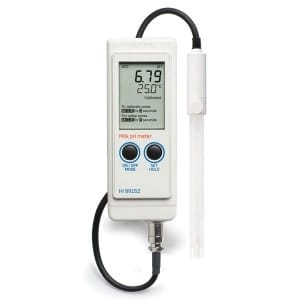
Hanna Instruments-99162 Portable pH/Temperature Meter for Milk Analysis
The Hanna Instruments-99162 is a portable pH and temperature meter designed specifically for milk analysis.
This meter is supplied with the FC101D pH electrode with internal temperature sensor. The FC101D is composed of food grade PVDF plastic and has a spheric tip providing a large surface area for contact with milk samples. The construction of this electrode provides accurate measurements both on the dairy farm and production facility.
Hanna Instruments-99162 features automatic calibration at one or two points with two sets of buffers. All calibrations and measurements are automatically compensated for temperature variations due to the internal temperature sensor in the FC101D electrode.
The split-level LCD displays both pH and temperature readings, along with indicators for reading stability, battery percentage, and calibration instructions.
Key features
- Application specific electrode
- Automatic temperature compensation (ATC)
- Stability indicator for accurate data recording
Application importance
The measurement of pH in milk is important in testing for impurities, spoilage, and signs of mastitis infection. While there are a number of factors that affect the composition of milk, pH measurements can help producers understand what might be causing certain compositional changes. pH measurements are commonly performed at various points in a milk processing plant.
Fresh milk has a pH value of 6.7. When the pH value of the milk falls below pH 6.7, it typically indicates spoilage by bacterial degradation. Bacteria from the family of Lactobacillaceae are lactic acid bacteria (LAB) responsible for the breakdown of the lactose in milk to form lactic acid. Eventually when the milk reaches an acidic enough pH, coagulation or curdling will occur along with the characteristic smell and taste of 'sour' milk.
Milk with pH values higher than pH 6.7 potentially indicate that the milk may have come from cows infected with mastitis.
Mastitis is an ever-present challenge with dairy milking cows. When infected, the cow's immune system releases histamine and other compounds in response to the infection. There is a resulting increase in permeability of endothelial and epithelial cell layers, allowing blood components to pass through a paracellular pathway. Since blood plasma is slightly alkaline, the resulting pH of milk will be higher than normal. Typically milk producers can perform a somatic cell count to detect a mastitis infection, but a pH measurement offers a quick way to screen for infection.
Understanding the pH of raw milk can also help producers optimise their processing techniques. For example, in operations that use Ultra High Temperature (UHT) processing, even small variations from pH 6.7 can affect the time required for pasteurisation and stability of the milk after treatment.

Frequently Asked Questions
Clear answers to help you choose the right water testing solution with confidence
Which brands of water testing kits do you supply?
Do you provide kits for both home and professional use?
Yes — whether you’re a pool or spa owner, aquarium keeper, utility company, or a university laboratory, we have the right solution for your needs.
Can I arrange servicing or calibration for my photometer?
Absolutely. We also provide servicing and calibration to keep your photometers accurate and reliable.
How quickly do you dispatch orders?
Orders placed before 2:30 pm (Monday–Friday) are dispatched the same day. We also ship on Saturdays for your convenience.
Which couriers do you use for delivery?
We deliver through UPS, DPD, and Royal Mail. You can also choose to upgrade to next-day delivery at checkout.
What is your return policy?
We accept returns within 14 days of delivery provided the items are unused, in their original packaging, and in resalable condition. Please contact our team before returning any items.
Can I place bulk or business orders?
Yes, we welcome bulk, trade, and institutional orders. For tailored pricing or large quantities, please get in touch with us directly.
How can I get help if I’m unsure which kit to buy?
You can call us at 📞 +44 (0)115888 2726 and our team will guide you in choosing the most suitable kit for your needs.
